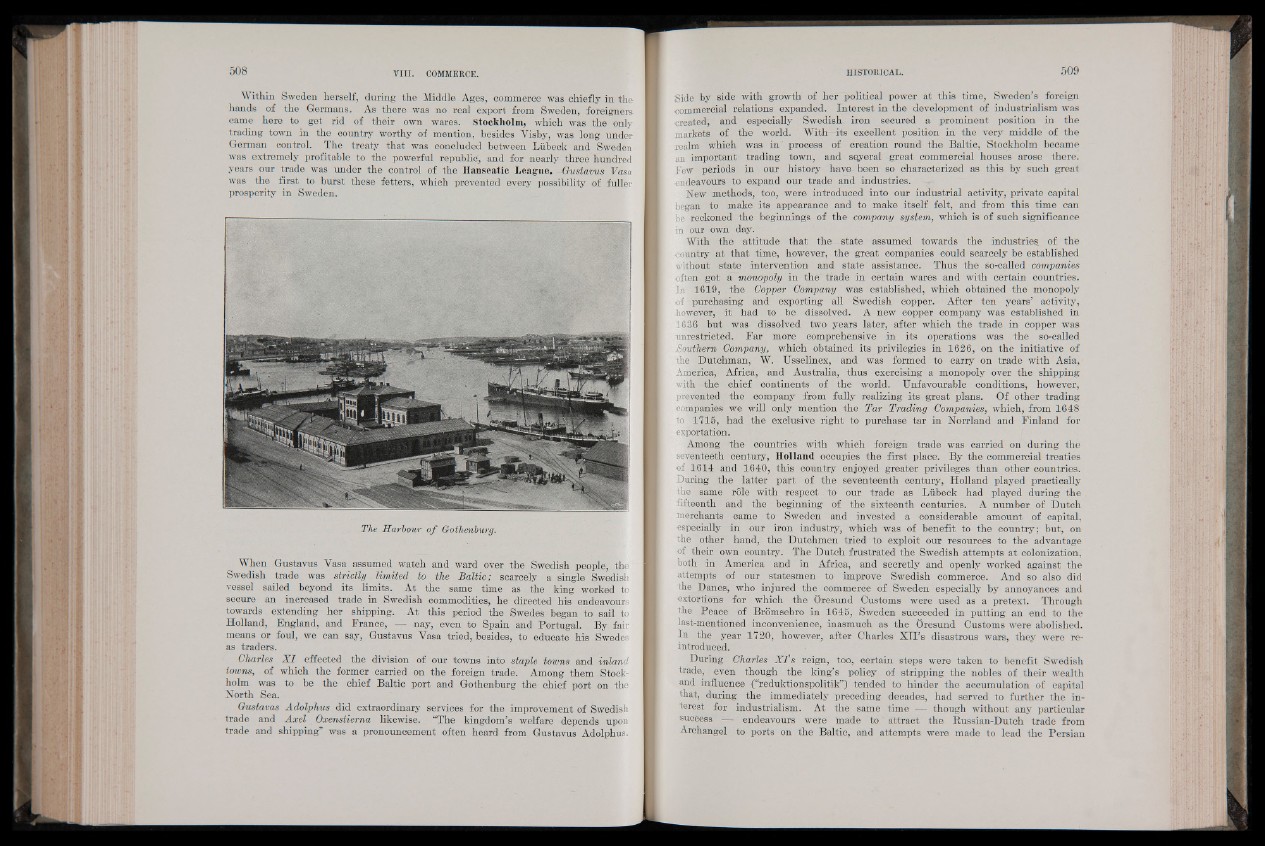
Within Sweden herself, during the Middle Ages, commerce was chiefly in the
hands of the Germans. As there was no real export from Sweden, foreigners
came here to get rid of their own wares. Stockholm, which was the only
trading town in the country worthy of mention, besides Visby, was long under
German control. The treaty that was concluded between Lübeck and Sweden
was extremely profitable to the powerful republic, and for nearly three hundred
years our trade was under the control of the Hanseatic League. Gustavus Vasa
was the first to burst these fetters, which prevented every possibility of fuller
prosperity in Sweden.
The Harbour o f Gothenburg.
When Gustavus Vasa assumed watch and ward over the Swedish people, the
Swedish trade was strictly limited to the Baltic; scarcely a single Swedish
vessel sailed beyond its limits. At the same time as the king worked to
secure an increased trade in Swedish commodities, he directed his endeavours
towards extending her shipping. At this period the Swedes began to sail 'to
Holland, England, and France, — nay, even to Spain and Portugal. By fair
means or ford, we can say, Gustavus Vasa tried, besides, to educate his Swedes
as traders.
Charles X I effected the division of our towns into staple towns and inland
towns, of which the former carried on the foreign trade. Among them Stockholm
was to be the chief Baltic port and Gothenburg the chief port on the
North Sea.
Gustavos Adolphus did extraordinary services for the improvement of Swedish
trade and Axel Oxenstierna likewise. “The kingdom’s welfare depends upon
trade and shipping” was a pronouncement often heard from Gustavus Adolphus.
' Side by side with growth of her political power at this time, Sweden’s foreign
commercial relations expanded. Interest in the development of industrialism was
j created, and especially Swedish, iron secured a prominent position in the
S markets of the world. With—its excellent position in the very middle of the
realm which was in' process of creation round the Baltic, Stockholm became
I an important trading town, and strerai great commercial houses arose there.
Pew periods in our history have been so characterized as this by such great
j endeavours to expand our trade and industries.
New methods, too, were introduced into our industrial activity, private capital
began to make its appearance and to make itself felt, and from this time can
! be reckoned the beginnings of the company system, which is of such significance
i in our own day.
With the attitude that the state assumed towards the industries, of the
country at that time, however, the great companies could scarcely be established
without state intervention and state assistance. Thus the so-called companies
! often got a monopoly in the trade in certain wares and with certain countries.
In 1619, the Copper Company was established, which obtained the monopoly
of purchasing and exporting all Swedish copper. After ten years’ activity,
however, it had to be dissolved. A new copper company was established in
1636 but was dissolved two years later, after which the trade in copper was
unrestricted. Far more comprehensive in its operations was the so-called
Southern Company, which obtained its privilegies in 1626, on the initiative of
the Dutchman, W. Usselincx, and was formed to carry on trade with Asia,
America, Africa, and Australia, thus exercising a monopoly over the shipping
with the chief continents of the world. Unfavourable conditions, however,
prevented the company from fully realizing its great plans. Of other trading
companies we will only mention the Tar Trading Companies, which, from 1648
to 1715, had the exclusive right to purchase tar in Norrland and Finland for
exportation.
Among the countries with which foreign trade was carried on during the
seventeeth century, Holland occupies the first place. By the commercial treaties
of 1614 and 1640, this country enjoyed greater privileges than other countries.
During the latter part of the seventeenth century, Holland played practically
the same role with respect to our trade as Lübeck had played during the
fifteenth and the beginning of the sixteenth centuries. A number of Dutch
merchants came to Sweden and invested a considerable amount of capital,
especially in our iron industry, which was of benefit to the country; but, on
the other hand, the Dutchmen tried to exploit our resources to the advantage
of their own country. The Dutch frustrated the Swedish attempts at colonization,
both in America and in Africa, and secretly and openly worked against the
attempts of our statesmen to improve Swedish commerce. And so also did
the__ Danes, who injured the commerce of Sweden especially by annoyances and
extortions for which the Öresund Customs were used as a pretext. Through
the Peace of Brömsebro in 1645, Sweden succeeded in putting an end to the
last-mentioned inconvenience, inasmuch as the Öresund Customs were abolished.
In the year 1720, however, after Charles XTI’s disastrous wars, they were re-
. introduced.
During Charles X T s reign, too, certain steps were taken to benefit Swedish
trade, even though the king’s policy of stripping the nobles of their wealth
and influence (“reduktionspolitik”) tended to hinder the accumulation of capital
that, during the immediately preceding decades, had served to further the interest
for industrialism. At the same time — though without any particular
success — endeavours were made to attract the Russian-Dutch trade from
Archangel to ports on the Baltic, and attempts were made to lead the Persian